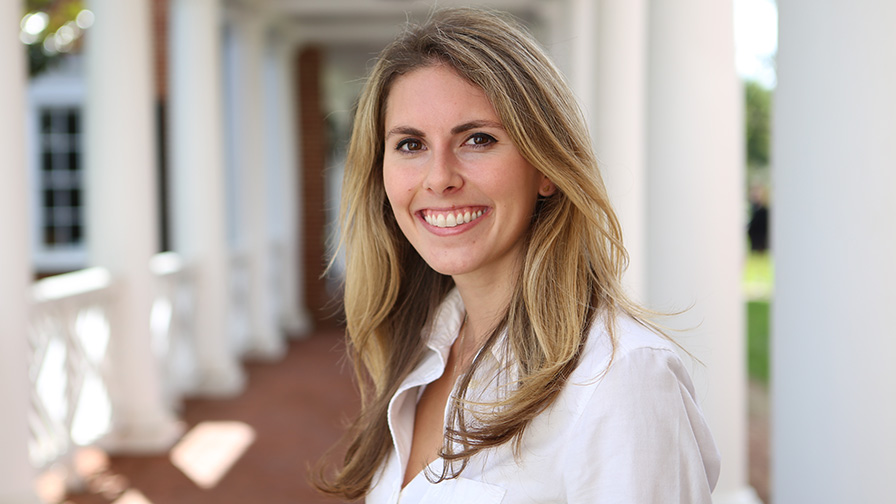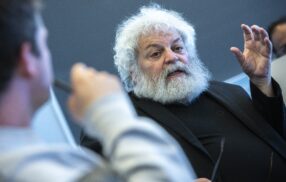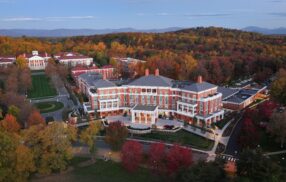
Auschwitz Fellowship Impresses Ethics Lessons on UVA Darden Student Through ‘Power of Place’
By Dave Hendrick
Before returning to the University of Virginia Darden School of Business for her Second Year, Katherine Salisbury (Class of 2017) was one of about a dozen MBA students selected to explore ethical business decision making in Europe through the historic lens of one of history’s great atrocities through the Fellowships at Auschwitz for the Study of Professional Ethics (FASPE) program.
Salisbury said the experience both built on her personal ethical framework and instilled new tools for considering the responsibility of corporate actions in a globalized world.
The program uses what it describes as the “power of place” in considering the actions of people, government and corporations leading up to and during the Holocaust, with a week of study in Germany and a week in Poland.
Through case studies and classes, the group took the lessons of the past and found their relevance to contemporary business, according to Salisbury.
“Today, you think about business issues where corporations have a chance to stop human rights violations and what responsibility they have,” Salisbury said. “We rely on governments to play that role, but where government is lacking or may be corrupt, what role do global corporations need to play?”
Salisbury said the group discussed the role that members of a corporation — especially junior workers — have when asked to undertake a task that might run counter to their values or appear morally suspect, and what role the individual bears in the actions of corporate wrongdoing.
The 2016 program was led in part by Darden Professor Mary Gentile, whose Giving Voice to Values program focuses on empowering business leaders to voice and act on their values.
“For me, the most interesting part was thinking about the difference between responsibility and choice that corporations have,” Salisbury said. “As a public company with multiple stakeholders that all have competing objectives, what responsibilities do corporations have to step into these issues? Is it their choice to step in based on different circumstances, or do they have a responsibility to always step in?”
Salisbury said the ethical aspects of her education thus far have been two-pronged, including coursework at Darden pertaining to how to make good decisions and be an ethical leader, but also more forward-thinking concepts like corporate shared values she learned during FASPE, including how one incorporates “ethical vertical integration” into a company — as well as the long-term benefits of doing so.
“I think there is a lot of discussion at Darden around both topics, and I didn’t realize how much Darden is at the forefront until I went on this trip and talked to one of my colleagues from another business school who said she was having issues getting an ethics class into the core curriculum,” Salisbury said.
Darden is regarded as a leader in the field of ethics instruction, which has long been part of the School’s required courses and the focus of numerous electives.
Nazi-era Germany has also served as the background for Darden courses in the past, with Professor Andrew Wicks leading Global Executive MBA students during the Germany portion of their Western Europe residency in a session on how individuals before and during World War II came to the point of engaging in what had been unthinkable acts.
After her fellowship, Salisbury completed a summer internship at MasterCard, a company she lauded for placing a priority on social mission and corporate shared values.
Salisbury hasn’t yet decided where she’ll work after Darden, but knows it will be “at a company trying to create social change and working toward a bigger goal than just simply creating something.”
The University of Virginia Darden School of Business prepares responsible global leaders through unparalleled transformational learning experiences. Darden’s graduate degree programs (MBA, MSBA and Ph.D.) and Executive Education & Lifelong Learning programs offered by the Darden School Foundation set the stage for a lifetime of career advancement and impact. Darden’s top-ranked faculty, renowned for teaching excellence, inspires and shapes modern business leadership worldwide through research, thought leadership and business publishing. Darden has Grounds in Charlottesville, Virginia, and the Washington, D.C., area and a global community that includes 18,000 alumni in 90 countries. Darden was established in 1955 at the University of Virginia, a top public university founded by Thomas Jefferson in 1819 in Charlottesville, Virginia.
Press Contact
Molly Mitchell
Associate Director of Content Marketing and Social Media
Darden School of Business
University of Virginia
MitchellM@darden.virginia.edu




